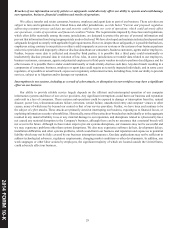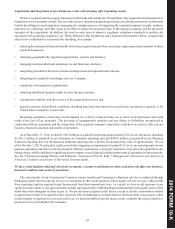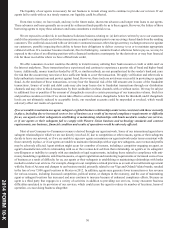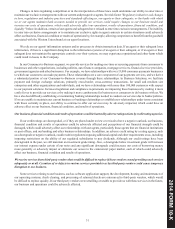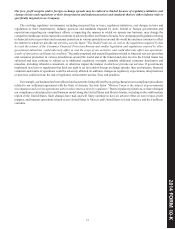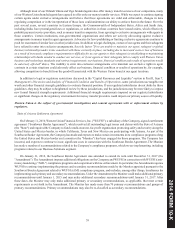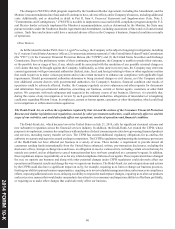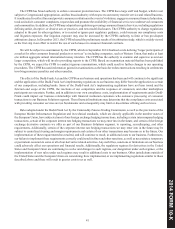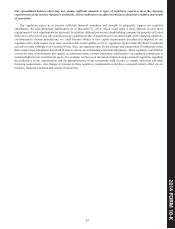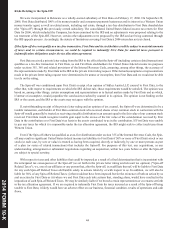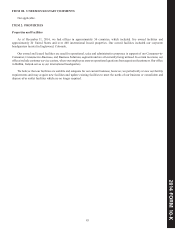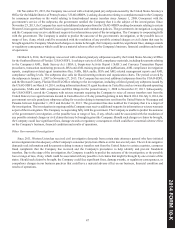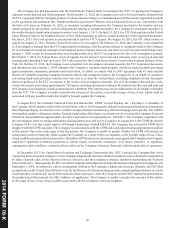Western Union 2014 Annual Report Download - page 176
Download and view the complete annual report
Please find page 176 of the 2014 Western Union annual report below. You can navigate through the pages in the report by either clicking on the pages listed below, or by using the keyword search tool below to find specific information within the annual report.
2014 FORM 10-K
38
In addition, one state and one United States territory have passed laws imposing a fee on certain money transfer transactions,
and certain other states have proposed similar legislation. Several foreign countries have enacted or proposed rules imposing
taxes or fees on certain money transfer transactions, as well. Although money transfer services themselves are not generally
subject to sales tax elsewhere in the United States, the current budget shortfalls in many jurisdictions, combined with continued
federal inaction on comprehensive immigration reform, may lead other states or localities to impose similar taxes or fees. Similar
circumstances in foreign countries have invoked and could continue to invoke the imposition of sales, service or similar taxes
on money transfer services. A tax or fee exclusively on money transfer services like Western Union could put us at a competitive
disadvantage to other means of remittance which are not subject to the same taxes or fees. Other examples of changes to our
financial environment include the possibility of regulatory initiatives that focus on lowering international remittance costs. Such
initiatives may have an adverse impact on our business, financial condition and results of operations.
Regulators around the world look at each other's approaches to the regulation of the payments and other industries.
Consequently, a development in any one country, state or region may influence regulatory approaches in other countries, states
or regions. Similarly, new laws and regulations in a country, state or region involving one service may cause lawmakers there
to extend the regulations to another service. As a result, the risks created by any one new law or regulation are magnified by the
potential they have to be replicated, affecting our business in another place or involving another service. Conversely, if widely
varying regulations come into existence worldwide, we may have difficulty adjusting our services, fees and other important
aspects of our business, with the same effect. Either of these eventualities could materially and adversely affect our business,
financial condition and results of operations.
Regulatory initiatives and changes in laws, regulations and industry practices and standards affecting us, our agents or their
subagents, or the banks with which we or our agents maintain bank accounts needed to provide our services could require
changes in our business model and increase our costs of operations, which could adversely affect our operations, results of
operations, financial condition, and liquidity.
Our agents and their subagents are subject to a variety of regulatory requirements, which differ from jurisdiction to jurisdiction
and are subject to change. Material changes in the regulatory requirements for offering money transfer services, including with
respect to anti-money laundering requirements, fraud prevention, consumer protection, customer due diligence, agent registration,
or increased requirements to monitor our agents or their subagents in a jurisdiction important to our business have meant and
could continue to mean increased costs and/or operational demands on our agents and their subagents, which have resulted and
could continue to result in their attrition, a decrease in the number of locations at which money transfer services are offered, an
increase in the commissions paid to agents and their subagents to compensate for their increased costs, and other negative
consequences.
Our regulatory status and the regulatory status of our agents could affect our and their ability to offer our services. For
example, we and our agents rely on bank accounts to provide our Consumer-to-Consumer money transfer services. We also rely
on bank accounts to provide our payment services. We and our agents are considered Money Service Businesses, or "MSBs,"
under the BSA, including our Business Solutions operations. An increasing number of banks view MSBs, as a class, as higher
risk customers for purposes of their anti-money laundering programs. Furthermore, we and some of our agents have had difficulty
establishing or maintaining banking relationships due to the banks' policies. If we or a significant number of our agents are
unable to maintain existing or establish new banking relationships, or if we or these agents face higher fees to maintain or
establish new bank accounts, our ability and the ability of our agents to continue to offer our services may be adversely impacted,
which would have an adverse effect on our business, financial condition, and results of operations.
The types of enterprises that are legally authorized to act as our agents vary significantly from one country to another.
Changes in the laws affecting the kinds of entities that are permitted to act as money transfer agents (such as changes in
requirements for capitalization or ownership) could adversely affect our ability to distribute our services and the cost of providing
such services, both by us and our agents. For example, a requirement that a money transfer provider be a bank or other highly
regulated financial entity could increase significantly the cost of providing our services in many countries where that requirement
does not exist today or could prevent us from offering our services in an affected country. Further, any changes in law that would
require us to provide money transfer services directly to consumers as opposed to through an agent network (which would
effectively change our business model) or that would prohibit or impede the use of subagents could significantly adversely
impact our ability to provide our services, and/or the cost of our services, in the relevant jurisdiction. Changes mandated by laws
which make Western Union responsible for acts of its agents while they are providing the Western Union money transfer service
increase our risk of regulatory liability and our costs to monitor our agents' performance.


